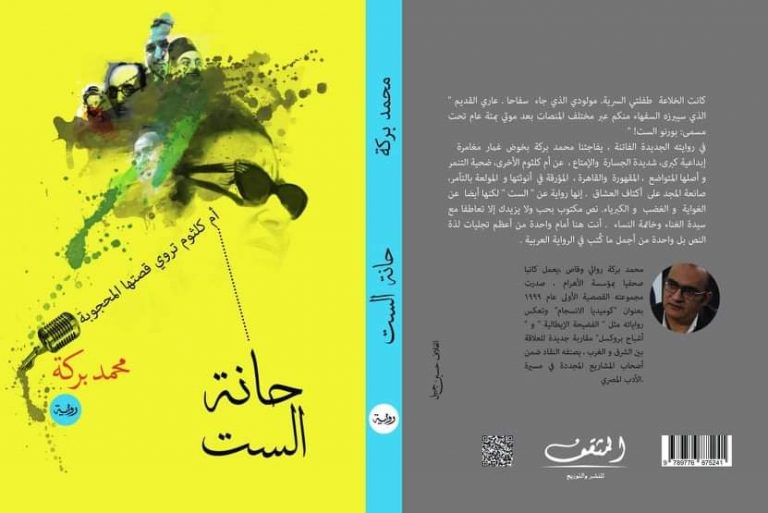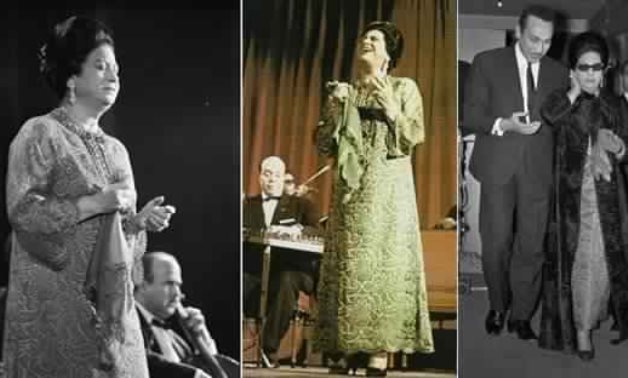
The Arabic Music Legend between the oppression of a male-dominated society and gender identity disorder
“The Mistress Inn” is a newly published novel written by the Egyptian writer Mohammed Baraka. It was given the subtitle “Umm Kulthum tells her veiled story” accordingly as it deals with the unknown side and taboos in the life of Mrs. Umm Kulthum (1898-1975), the legendary icon of music in the Arabic Culture.

Umm Kulthum was the singer who changed the aspects of this art completely and gave it its independent Arabic personality after decades of being just a faint echo or a reflection of the Turkish art. She presented the most famous immortal classical songs which spread widely not only in Egypt but also in all Arab countries from the Ocean to the Gulf. It was not surprising that she held a number of titles, such as “Planet of the East” and “The Mistress of Arabic Singing”. Over the years, Umm Kulthum turned from being an inspiring figure into a sacred icon on both the social and cultural sides. Accordingly, this novel tries to remove the holiness of this character and scratch the statue of the female legend.
This work tackles the unofficial account of Umm Kulthum’s life. It sheds light on her upbringing in a male-dominated society, her father’s preference of her brother over her and the tense relationship with her father, who worked as an imam of a mosque. More light is shed on the period she spent in the religious educational center “Al Kottab” and how she was bullied by her colleagues and persecuted by the Sheikh.
The novel also focuses on the disorder of her physical identity owing to her obligation to wear men’s clothes while singing in humble local weddings and parties for the sake of earning a living for her poor family. The conservative rural society in her village considered femininity a shame, especially when a girl worked in public activities, as a result Umm Kulthum had to keep on wearing men’s clothes even after moving to the Egyptian capital city, Cairo. All these hard circumstances had much to do with causing her disorder in her physical and sexual identity.
One of the crucial events in the stream of the novel is the physical violence she was subjected to by her father and later by her last husband, the dermatologist, when they slapped her in the face more than once.
The novel also records Umm Kulthum’s relations with the excessive political changes in the Middle East in the mid-twentieth century and how, for example, she was subjected to persecution at the beginning of the 1952 Revolution, according to which Egypt was transformed from a monarchy country to a republic. In the beginning of such revolution she was considered a relic of the former monarchy, but Gamal Abdel Nasser, The Leader of the Revolution refuted this claim and apologized to her.
The novel also depicts the exceptional social and class evolution of Umm Kulthum from a very poor illiterate girl into a close friend of kings and presidents.
The narrator of the novel is the spirit or specter of Umm Kulthum which appeared to the author who seated it on the Chair of Confession and let it tell the veiled and unknown story.
Local reaction towards the novel
The novel gained a great deal of approval and was also praised by renowned writers and critics however other writers and critics regarded it as an insult to a historical symbol in the Arabic culture. These loud disagreeing voices led to preventing the author from appearing on some television programs!
Novel strategy
Writing this novel required a very well-planned process preceded by comprehensive research and the documentation of historical resources. We must bear in our minds that the writer invented some imaginary details to serve and strengthen the plot of the novel. Accordingly, we can say that this novel is a fantastic mixture of both restricted reality and literary fiction.
An excerpt from chapter 1
“I have a thick neck, thicker than you think.
My genuine dark skin surprises many of my fans when they look at my old photos after adding color effects. My voice locates in between masculinity and femininity and this is the secret of its exceptional uniqueness. My voice is the brand single copy that God created; He decided not to recreate it because he wanted it to be immortal.
My palm is big and my fingers are not as tender as those of your beautiful daughters.
This is true, perfectly true.
I am the daughter of destitute fellahin who did not hold a single academic degree. My thyroid gland deteriorated and caused my eyelids to resemble those of a witch living in a grave yard. When I wore my black glasses day and night I became a stereo-typed photocopy of an old woman whose only proof of femininity was what is written in the gender field in the ID card.
My proper name is compound. Its uniqueness goes beyond the traditional classification. It is composed of two syllables: “Umm” means that I am officially female, while “Kulthum” means that a male-fellow is carried on my back in times of touring and travelling.
My marriages are a top secret, what is known about them is surprising, and what is unknown is awfully unbelievable. One husband was bald and plump, another was a butcher boy, and between them there was a history of seduction, sins and passion.
I learned that femininity meant shame, so I lived the sweetest years of my life disguised in a Bedouin headband a blue coat and a tight belt around my waist so that I could prove to everyone that I was a man and son of a man. By doing so, my family managed to avoid being scandalized by having a singer-daughter.
My family didn’t mind enriching over my voice but this came at the expense of my genuine identity.
My body housed a potential scandal, so I wore neither embellished nor silky dresses.
Dragging the tail of her black dress and wrapping her hair with a black veil, the nine-year-old girl had difficulty in breathing in hot August.”
Why this novel interests the European reader
* It presents an exciting thriller about the most powerful woman in the Middle East who managed to overcome all hardships and extreme conditions of oppression and bullying in a patriarchal society – A woman who reached the peak of success in spite of everyone and everything.
* The novel records the social, cultural and political conditions and developments in the Middle East during the twentieth century.
[author title=”Mohammed Baraka ” image=”https://sindhcourier.com/wp-content/uploads/2021/09/Mohammed-Baraka-Egypt-Writer-Sindh-Courier.jpeg”]Mohammed Baraka born in 1972 is an Egyptian writer. He works as a journalist in Al-Ahram, the widely-spread newspaper. He has published five novels and four short story collections so far. [/author]
Translated into English by
Mohammed El Hedeiny